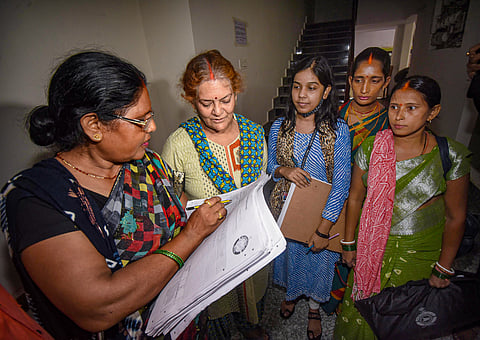Caste census nod may influence Bihar polls, dampen Opposition's hope: Expert
NEW DELHI: The decision to include caste enumeration in the upcoming national census is expected to have major electoral implications in the Bihar Assembly elections set for September–October, potentially giving the ruling NDA a strategic edge in a state where caste remains a key factor in political mobilisation.
The decision by the Modi-led central government has effectively blunted a key campaign narrative of the Opposition, particularly the Rashtriya Janata Dal (RJD) and the Congress, who had been fervent advocates of a caste census. The move has the potential to disrupt the Opposition’s attempts to galvanise Other Backwards Classes (OBCs) and marginalised communities around this issue.
Importantly, the Janata Dal (United) — JD(U) — which leads the NDA in Bihar now , had long championed the cause of caste-based enumeration. Although the JD(U) was previously part of the Mahagathbandhan (Grand Alliance) government, it had already taken the initiative to conduct a state-level caste-based survey independently. This move had been projected as a milestone in understanding and addressing caste-based disparities in Bihar.
“With one well-crafted decision, notably just 5 to 6 months before the Bihar polls, to hold the caste census as part of the national census by the Modi government has certainly dampened the poll plank of the Opposition, which has been taking on the NDA on this issue. The Modi government, with this decision, has succeeded to a great extent in preventing polarisation of OBCs and other marginalised communities towards Mahagathbandhan,” remarked Dr R K Verma, a noted political analyst from Bihar. He further described the decision as “an act of putting an end to the Opposition narrative.”
Traditionally, caste dynamics have been a major driver in Bihar’s political alignments. The inclusion of caste enumeration in the national census not only weakens the misinformation campaigns alleging NDA’s reluctance on the issue but also repositions the alliance as responsive to the socio-political concerns of the state.
While over 45% of Bihar’s population comprises OBCs, and an estimated 40–50% includes other extremely poor and marginalised communities, the credit for initiating the discourse may still be partially attributed to the RJD and the Congress. However, the perception of the NDA as ‘anti-caste census’ is expected to diminish significantly.
Dr Nikhil Anand, the BJP OBC Morcha’s national general secretary and a senior leader in the Bihar BJP, affirmed the significance of the move. “The decision has once again reflected the PM Modi as being the single genuine well-wisher of OBC and poor castes with this decision,” he stated.
Political observers believe that the strategic timing and national scope of this announcement could prove decisive for the NDA’s electoral prospects. It not only aligns with the aspirations of large voter segments but also reclaims the narrative that had been monopolised by the Opposition. As Bihar braces for another fiercely contested assembly election, caste remains an enduring reality of its political arithmetic, and this latest move may just have shifted the equation in favour of the NDA.

